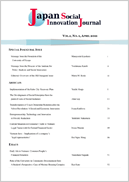Volume 4, Issue 1
Special Double Issue on Creative people and Migration: Social Innovation in organizations and communities – Guest editors: Hiroya Hirakimoto, Maria Reinaruth Carlos, Pauline Kent
Displaying 1-5 of 5 articles from this issue
- |<
- <
- 1
- >
- >|
Articles
-
2014 Volume 4 Issue 1 Pages 1-8
Published: April 03, 2014
Released on J-STAGE: April 03, 2014
Download PDF (89K) -
2014 Volume 4 Issue 1 Pages 9-19
Published: April 03, 2014
Released on J-STAGE: April 03, 2014
Download PDF (381K) -
2014 Volume 4 Issue 1 Pages 20-33
Published: April 03, 2014
Released on J-STAGE: April 03, 2014
Download PDF (362K) -
2014 Volume 4 Issue 1 Pages 34-43
Published: April 03, 2014
Released on J-STAGE: April 03, 2014
Download PDF (344K) -
2014 Volume 4 Issue 1 Pages 44-54
Published: April 03, 2014
Released on J-STAGE: April 03, 2014
Download PDF (800K)
- |<
- <
- 1
- >
- >|
